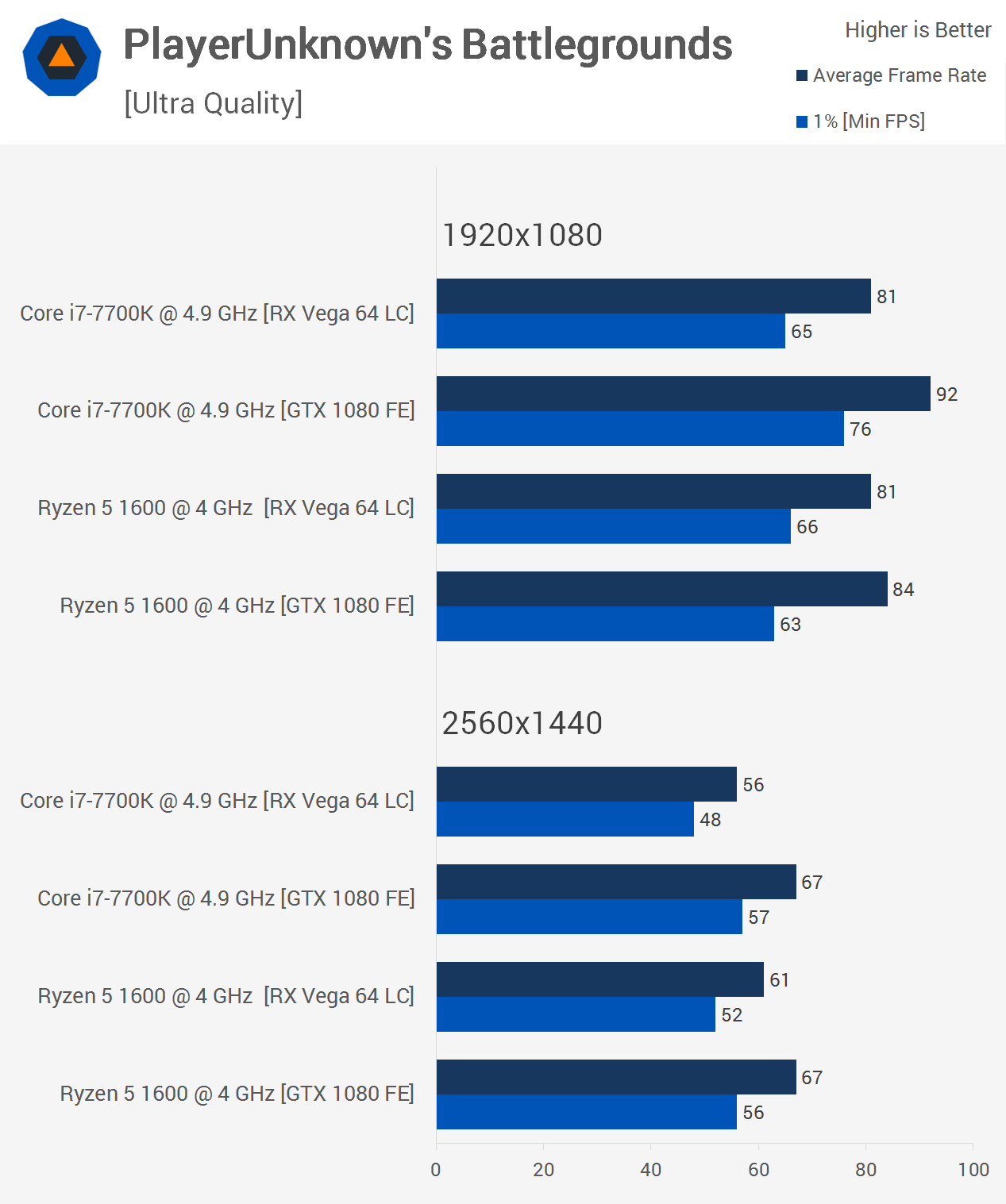Core i7 vs. Ryzen 5 with Vega 64 & GTX 1080
With the arrival of Ryzen early this yr the discussion of desktop calculating performance got interesting once more. Ryzen 7 delivered adjacent-level productivity performance at prices previously unheard of for eight-core/16-thread CPUs. With PC gaming existence a cardinal role of the performance equation for many enthusiasts, it was still open for debate how good gaming on AMD's new fries was equally first reviews gave united states of america a less than impressive outlook in spite of all that processing power.
By the fourth dimension Ryzen 5 came effectually a month subsequently, AMD took a number of important steps to improve performance and compatibility of the Ryzen platform. Gaming saw noteworthy gains merely Ryzen kept trailing the Cadre i7-7700K in the vast majority of modern titles.

At this bespeak, endless theories have been presented to explain Ryzen's weakness on gaming performance, and most of them have proven to be incorrect. Still, early on many noticed that Ryzen's DirectX 12 performance was non good, which added to the defoliation as we expected the cadre-heavy AMD CPUs to accept an reward using the more modern API.
Later further investigation, the guys at AdoredTV discovered that Ryzen'southward poor performance in some DirectX 12 titles, namely Rise of the Tomb Raider, was actually downwardly to the GeForce graphics card. This discovery set online discussion alight with claims that Nvidia was gimping Ryzen'southward gaming performance and with no high-finish AMD GPUs on the marketplace this was harder to verify.
But this alone couldn't explain abroad Ryzen'due south oft lackluster gaming performance, as the upshot was only seen in select DX12 titles and wasn't a trouble for older DX11 games. DX11 simply favors higher clock speeds and Intel still has a significant advantage hither. Couple higher clocks frequencies with superior IPC performance and that makes information technology difficult for Ryzen to put in a strong showing with these older titles.

Even so, Ryzen should look very capable in games taking advantage of DirectX 12 and yet with a GeForce graphics card handling the rendering work this wasn't the case in Rise of the Tomb Raider, Total War Warhammer, Deus Ex: Flesh Divided, The Division, and Hitman, to cite some examples. The adept news is that with the release of Vega 64, nosotros how have a high-end GPU from AMD and one that we tin compare to the GeForce GTX 1080.
Like Ryzen, Vega has had a bumpy launch on the gaming performance front and some have even blamed that on Intel's CPUs, which are frequently used for testing high-end GPUs. So I thought, why not impale two sets of benchmarks with one go?
Past using the Cadre i7-7700K and Ryzen 5 1600, each with the Vega 64 and GTX 1080 at 1080p and 1440p we take some very interesting results to become over. Further, we suspect these are typical hardware combinations many are considering for building a new high-end rig when gaming is a big gene.
For testing we have overclocked both CPUs: the 7700K was pushed to four.9GHz while the Ryzen 5 1600 sabbatum at 4GHz, both fairly typical overclocks for these CPUs...

Starting things off, permit's check out the Battlefield 1 results. I'm yet testing this championship using DX11 as it generally provides the best results. That said, I do have to investigate DX12 performance once again hither and I will do that soon. For now we take the DX11 figures.
Here the Ryzen five 1600 is extremely competitive, even at 1080p, though it has to be said the 1% low results are noticeably lower. Even so, the margins between the GTX 1080 and Vega 64 graphics cards to remain much the same with either CPU.

PlayerUnkonwn'southward Battlegrounds isn't a game nosotros tested with previously as it wasn't released dorsum when I conducted my initial Ryzen vs. Cadre i7 tests. Given how hugely popular the game is right now, I idea we might likewise take a await anyway. Looking at the 1080p results first, nosotros encounter that Vega 64 delivers the exact same performance using either the R5 1600 or 7700K.
The GTX 1080 on the other hand sees slightly lower 1% results with the R5 1600 than Vega 65 did, though the average is slightly increased. Notwithstanding, the GTX 1080 was miles faster with the 7700K, which is likely downwardly to the fact that nosotros have more headroom here with the faster CPU. This certainly seems to be the case as we move to 1440p as hither the GTX 1080 delivers the exact same functioning using either CPU.
We likewise noticed something of interest at 1440p: the Vega 64 is slightly faster using the R5 1600 versus the 7700K. Spoiler... this won't be the last fourth dimension you'll encounter results like this.
Remember that all the results in this commodity are based on an average of three runs. All the same, these results were reconfirmed days after and I found the exact same margins. Also as I said, other games exhibited this same strange behavior at 1440p also.

In fact, some other game where we can come across this is Dirt 4. Here Vega 64 was consistently faster with the R5 1600 processor at 1440p. The margins weren't huge but here Vega delivered vii% more frames on average with the Ryzen CPU. Oddly yet information technology was a different story at 1080p and here the 7700K provided five% more frames with Vega.
In an interesting twist Ryzen was consistently faster than the Core i7 at both resolutions when comparing the one% low results with the GTX 1080. Then DiRT 4 provided quite a few interesting results for us.
Source: https://www.techspot.com/review/1490-ryzen-vs-core-i7-vega-64-geforce-1080/
Posted by: paytonthopity.blogspot.com


0 Response to "Core i7 vs. Ryzen 5 with Vega 64 & GTX 1080"
Post a Comment